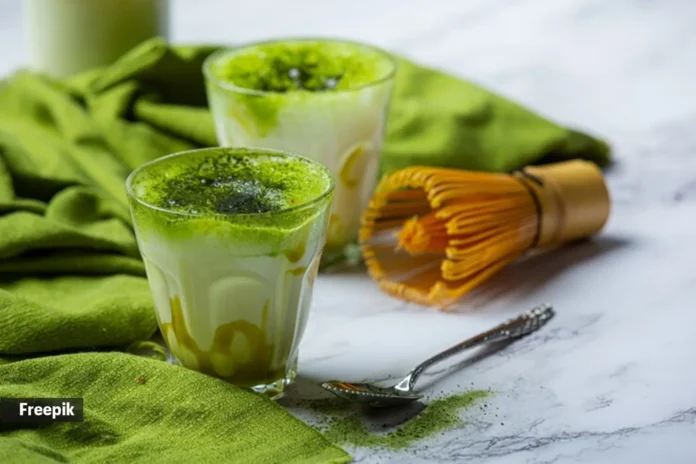In a recent social media post, digital creator Mona Vand sheds light on a common mistake made when preparing matcha tea – using a metal spoon with matcha powder. The video reel emphasizes the importance of choosing the right utensil for the job, suggesting that using a wooden spoon enhances the overall experience and taste of matcha.
Matcha, a finely ground powder made from specially grown and processed green tea leaves, has gained popularity for its unique flavor and potential health benefits. However, the process of preparing matcha requires careful attention to detail, including the choice of utensils used.
Vand explains in her post that using a metal spoon with matcha can negatively impact the tea’s taste and quality. She encourages her audience to opt for wooden spoons instead, citing their ability to enhance the sensory experience of preparing and enjoying matcha. According to Vand, using wooden spoons adds an element of elegance and fosters a sense of connection with nature, ultimately improving the overall enjoyment of the tea.
While some may overlook the significance of the utensils used in preparing matcha, Vand’s post serves as a reminder of the importance of mindful preparation practices. Matcha enthusiasts and tea aficionados alike are urged to consider the impact of their utensil choices on the final product, with Vand advocating for the use of wooden spoons as a simple yet effective way to elevate the matcha experience.
As interest in matcha continues to grow, Vand’s insights offer valuable guidance for both novice and seasoned matcha enthusiasts. By paying attention to the finer details of matcha preparation, individuals can unlock the full potential of this beloved beverage and savor its unique flavor profile to the fullest.
Matcha, with its vibrant green color and rich, earthy flavor, has become a staple in many households and cafes around the world. Made by finely grinding specially grown and processed green tea leaves, matcha is known for its high concentration of antioxidants and potential health benefits. However, achieving the perfect cup of matcha requires more than just quality tea leaves—it also involves careful attention to the preparation process.
One of the key factors that can influence the taste and quality of matcha is the utensil used to scoop and mix the powdered tea. Traditional Japanese tea ceremonies often employ bamboo utensils, such as bamboo tea scoops and whisk holders, to prepare matcha. These utensils are crafted with care and precision to ensure that they do not impart any unwanted flavors or odors to the tea.
In contrast, metal spoons, particularly those made from stainless steel or other alloys, can react with the delicate compounds in matcha, altering its flavor and aroma. Additionally, metal spoons may scratch or damage the delicate surface of the matcha bowl, affecting its aesthetic appeal.
Wooden spoons, on the other hand, are prized for their natural beauty and gentle touch. When used with matcha, wooden spoons provide a smooth and seamless experience, allowing the tea to be scooped and measured with precision. Furthermore, wooden utensils are less likely to interact with the matcha powder, preserving its flavor and integrity.
Beyond the practical considerations, there is also a symbolic significance to using wooden utensils with matcha. In Japanese culture, wood is revered for its connection to nature and the natural world. By using wooden spoons to prepare matcha, enthusiasts can cultivate a deeper appreciation for the environment and the origins of the tea.
In her social media post, Mona Vand highlights these aspects of the matcha experience, encouraging her audience to embrace the beauty and simplicity of wooden utensils. By making a conscious choice to use wooden spoons with matcha, individuals can elevate their tea-drinking ritual and create a more mindful and intentional connection with the beverage.
As interest in matcha continues to grow, Vand’s insights serve as a reminder of the importance of mindful preparation practices. By choosing the right utensils and taking the time to savor each step of the process, tea enthusiasts can unlock the full potential of matcha and enjoy a truly exceptional drinking experience.

